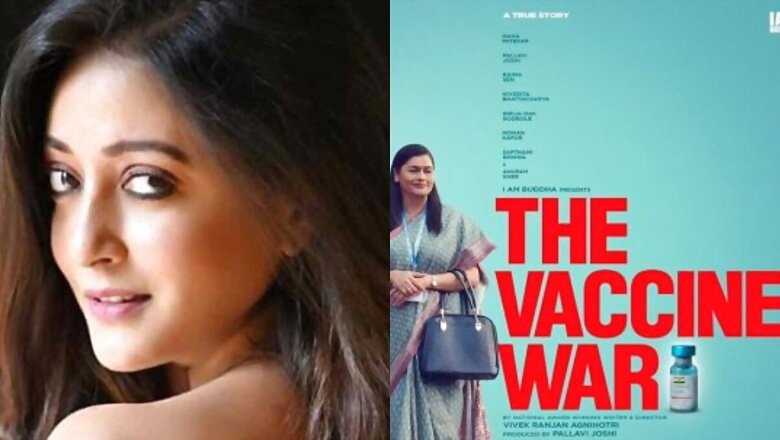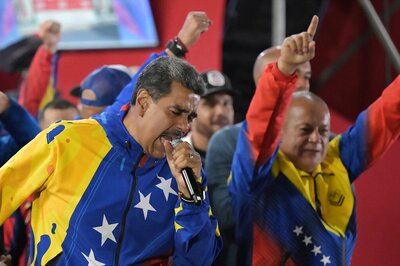
views
Raima Sen is a versatile actress who has essayed a wide variety of roles in her stellar career. Whether it was Fun2shh… Dudes in the 10th Century, Parineeta, Dus, Honeymoon Travels Pvt. Ltd. or the recent web series like Mai and The Last Hour, the actress has evidently surpassed her own performances with every unconventional characters she portrayed. Vivek Agnihotri’s most recent release The Vaccine War was not an exception. Essaying a journalist with a negative bone in her body might have brought her a fair share of trolling but that didn’t deter her from doing her job with perfection.
In an exclusive interview with News18 Showsha, Raima Sen talked about her character, the preparation that went behind it, the backlash she received and more.
Here are the excerpts:
I read somewhere that you were not Vivek Agnihotri’s first choice for the film. And that it was a happenstance when he approached you and offered you this character. Considering that this character that you are playing is an antagonist, what compelled you to say yes to it?
In life, there has to be good and bad. Somebody in the film has to be a villain and somebody in the film has to be a hero. I accepted this film because it is about the victory of Indian women, the victory of the vaccine war, women empowerment and this film will go down in history. People will know how we made the vaccine and the story behind all these women scientists. You cannot make a film in a positive light and somebody has to play the bad cop. He gave me the role and he just told me that ‘you play your role convincingly and honestly’. Because there were particular journalists during the pandemic that were against it, there were a lot of articles and there was a lot of negativity. A lot of people thought India cannot do it. Whatever I am portraying in this film is about a journalist who believes India can’t do it. I’ve played the character convincingly and honestly and I believe what’s happening is just a sham. So I thought it was a challenging role for me to make a comeback. It was more challenging and impactful than anything else. He told me that people won’t love you in this but definitely they can’t ignore me which is a good thing.
We got a brief idea about your character from looking at the trailer but still there’s a lot to that character that meets the eye. Tell me something about this role and what was your personal journey with it during the course of shooting the film?
So I saw a lot of videos of how journalists were talking during the pandemic. I saw the good ones, the bad ones, the ones that were neutral. So I was watching all those videos and getting a reference. And then, you have to make the character your own and I can’t copy anyone. So I spoke to Vivek and we sat and we did a lot of readings. And he just gave me one brief. He was like ‘if this is your job, whatever you tell the audience, you say it convincingly. Even if it is negative, in your eyes it’s not negative. The world can think but this is your opinion’. So he told me to do it honestly.
The character you played is a controversial one. People might claim that the film is trying to paint a section of the journalism industry in a bad light. How did you all tackle that. Were there reservations on your end?
I am sure they will. When Vivek Agnihotri announced that I was in the film, I got trolled. There were so many followers who said so many things to me. My stance was always non-controversial from the start. For me to get these kinds of reactions from followers and audiences was very upsetting. And I had to call my dad and I said, ‘People are abusing me and unfollowing me and saying all sorts of things’. So he put me back into the groove. He told me, ‘You are an actor, this is your profession. And you have done it because you chose to do it at that point. It’s your choice’. So what people are going to make out of this film is really none of my business. My job as an actor was to play the role honestly and leave it on the audience. What they want to decide, or think or feel, is up to them. I can’t control anything.
Were there reservations on your end?
Yeah I was skeptical. At first I thought, I live in Bengal. But then I thought I was an actor. Just because I am doing a film, it doesn’t mean I am politically affiliated with anything. I was just doing my job as an actor. I thought this was going to be an impactful film. I would rather be in a film, good or bad which goes down in the history than saying to any kind of film that is coming my way.
Vivek Agnihotri has said that the film doesn’t only celebrate the Indian vaccine but also is a beacon of women empowerment. Can you elaborate on that as to what he means by that?
He had shown us how these vaccines were made by women. I had no idea that women scientists had to leave their families behind, and what they have achieved. That’s why we are celebrating their lives and achievements. They managed to make the vaccines. Again the whole world was trying to do. And although my character doesn’t contribute to that since I am a journalist in a negative light, she is a strong character. She believes in her own morals and values and her work. She is telling Dr Bharghav that India can’t do it because she believes that India has probably not done it before.
I believe this was your first time working with Vivek Agnihotri. He is considered as a controversial director and his last film too was mired in controversies. Strictly speaking in the context of a film-maker and a storyteller, how efficient is he in following with his vision, his equations with the actors etc?
On the sets, he was very nice and helpful and comfortable. He knew his job and so there are no extra shots, no extra information, no extra hours. He knew what he wanted and if you gave it to him, everything was smooth and easy.
You’ve been away from Hindi cinema for a very long time. Although we saw you in Mai and the Last Hour but you have been very selective with Hindi movies. What’s the reason behind that?
It’s because I’ve not really got what I wanted. I am lucky that I have a backup in the form of the Bengal film industry. When I am not getting the kind of films that I want to do in Bollywood, I am working here in the types of films I want to do. I always choose the best of what I get. If I get five films, out of which two are good, then I’ll choose probably one. I have also done a Tamil film which will be released in the future. It’s not like I am not working but I am waiting for something nicer. Because there’s so much competition, so many actors that I might get lost, and thus I have to do something different. I can’t just do anything and keep getting lost, at this juncture of my career. We have to be wise about it.
Finally, what sort of dialogue and conversation do you hope that The Vaccine War starts?
They will be educated and they will become more aware about what happened in the pandemic. They’ll know who are the people who sacrificed their lives to make these vaccines and how come we were given this opportunity to make these vaccines, how we succeeded and why we weren’t given this opportunity before. It’s a very knowledgeable subject and people should be aware that India managed to do something so great, but what happened behind the scenes was crucial to make it happen.

















Comments
0 comment